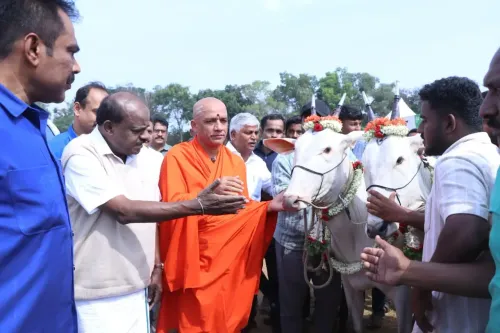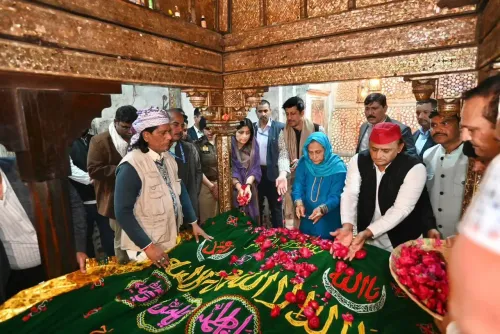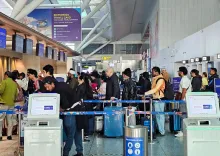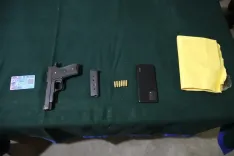Why Was an Elderly Hindu Man Brutally Assaulted in Bangladesh?
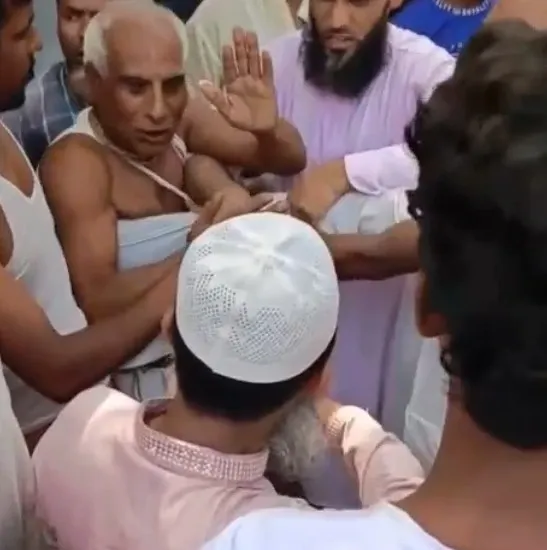
Synopsis
Key Takeaways
- Violence against minorities: The case highlights systemic violence faced by religious minorities in Bangladesh.
- Police complicity: There are serious concerns about local police enabling such acts rather than protecting victims.
- False blasphemy accusations: The incident reflects a dangerous trend where blasphemy claims are used to incite violence.
- Community solidarity: The protest by students shows that there are still voices advocating for justice and human rights.
- Urgent need for intervention: The situation calls for immediate action from international bodies to protect vulnerable populations.
Dhaka, June 24 (NationPress) A 69-year-old Hindu barber, Poresh Chandra Shil, suffered a brutal attack by a mob in the Lalmonirhat district of Bangladesh due to a false accusation of blasphemy, as reported by the Human Rights Congress for Bangladesh Minorities (HRCBM) on Tuesday.
The organization condemned the violence, highlighting that Shil's son was also manhandled while pleading with the mob to spare his father's life.
According to HRCBM, local police did not intervene to protect the victims; instead, they exacerbated the situation, with a senior officer allegedly stating plans to file fabricated charges to ensure Shil's lifelong imprisonment—this action is in stark violation of both Bangladesh's Constitution and international human rights norms.
The incident unfolded on June 20 around 2:30 PM when Md. Abdul Ajiz, a self-proclaimed Imam from Al-Hera Jame Mosque in Namatari, visited Shil's salon for a haircut. Ajiz later claimed that Shil made derogatory comments regarding the marriage of Islam's prophet to a young girl. His formal complaint indicated that only Md. Najmul Islam (29) was present during the alleged incident,” the HRCBM stated.
However, the complaint also included Md. Sajid Hussain (17), Md. Jubaier Hussain (35), Md. Tarek Hussain (28), and Md. Nurul Islam as witnesses, raising questions about their actual presence during the conversation.
HRCBM obtained a video from Shil's daughter-in-law, Dipti Rani Roy, who presented a contrasting narrative. In the footage, Roy explained that Ajiz had become furious after being asked to pay the 10 Bangladeshi Taka service fee for his haircut, leading him to fabricate the blasphemy accusation to incite a violent mob.
The video revealed the brutal beating of Shil and the physical assault on his son as he begged for his father's safety.
The family firmly denied any derogatory statements, labeling the blasphemy claim as a “fabricated pretext for violence and looting” that reflects a long-standing pattern of persecution against religious minorities in Bangladesh.
HRCBM expressed doubts about the credibility of the complaint, stating, “In a nation where Hindus and other minorities face systemic oppression, would an elderly barber dare to make such a provocative statement in his own shop?”
The organization highlighted inconsistencies in witness testimonies, asserting that this case follows a troubling pattern of “fabricated blasphemy cases” where individuals exploit religious sentiments to harass minorities.
HRCBM criticized local police for their role in the persecution, citing a statement from the officer-in-charge: “I have arrested him, and I will file such a case that he will spend his entire life behind bars.”
This statement was described as inflammatory, lacking verified evidence and based solely on hearsay.
The organization emphasized that this case is indicative of a broader “systemic pattern of state-enabled persecution” where law enforcement fails to protect minority citizens and instead fuels mob violence.
In the backdrop of this climate of fear, a small group of students from Dhaka University held a protest to denounce the attack and demand justice for Shil.
HRCBM characterized this act of solidarity as rare yet courageous, revealing the “risks and moral consciences that still exist within Bangladeshi society.”
The organization has called for immediate international intervention to safeguard Bangladesh's minorities from further violence and persecution, demanding accountability for both the perpetrators and the state officials involved in the assault.




